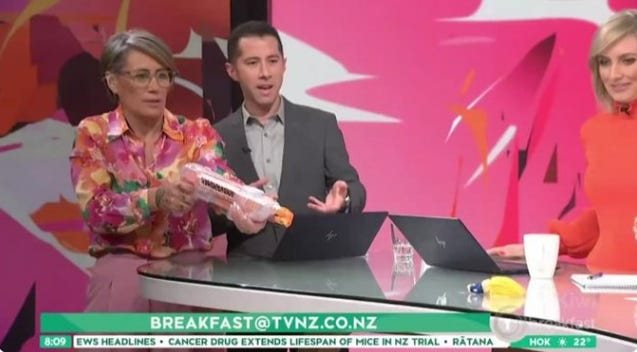Eighteen months ago, TVNZ Breakfast hosts used a Donald Trump doll as a target for shooting a Salt gun. The segment aired in January 2023 but was widely shared on social media in the hours following the assassination attempt at a Pennsylvania rally on Sunday (NZ time), during which Trump was grazed with a bullet, one audience member was killed and two others seriously injured. Three complaints were made to the Broadcasting Standards Authority (BSA) at the time, but for some reason, was not upheld.
Now a year-and-a-half later TVNZ said it had “noted (the segment) was inappropriate and apologised for any offence caused at the time”.
The apology coming 18 months after the event raises questions about its sincerity, especially as it's in response to renewed attention rather than a proactive acknowledgment.
As a rule of thumb, an apology might be considered insincere if it comes long after the incident. Using language like “any offence caused at the time” instead of acknowledging specific wrongdoing is deflecting blame onto those that took offence. It appears that no actions are being taken to address the underlying issues and is merely brushing the issue of media bias, against those with a different political view. aside.
New Zealand media has a history of bias. During the Covid pandemic, New Zealand media outlets were accused of bias in their coverage of government policies, public health measures, and in particular the mandate protests outside parliament. Being a small media industry, there's often movement of journalists between outlets, which has led to a media bubble with shared biases.
Media bias remains a complex and persistent issue in journalism. While complete objectivity may be an unreachable ideal, the pursuit of fairness, accuracy, and transparency is crucial for maintaining the credibility of the press and its vital role in democratic societies. Apologies, when warranted and executed effectively, can play an important part in this process. However, they must be accompanied by genuine efforts to address the root causes of bias and improve journalistic practices.
In 2004, The New York Times published an editors' note apologising for its coverage of the lead-up to the Iraq War. The newspaper acknowledged that some of its reporting relied too heavily on sources who were pushing for military action and that it had failed to be sufficiently sceptical of claims about weapons of mass destruction. This apology was significant but only came when the lies about Saddam Hussein having weapons of mass destruction became indisputable. Today the “paper of record” is still a funnel for government propaganda.
In 1998, CNN retracted a story alleging that the U.S. military had used nerve gas in a mission to kill American defectors in Laos during the Vietnam War. The network issued a lengthy apology, fired two producers, and accepted the resignations of others involved in the story. This case highlighted the importance of thorough fact-checking and the dangers of relying on unreliable sources.
In 2015, Rolling Stone retracted a story about an alleged gang rape at the University of Virginia after the account was found to be false. The magazine issued an apology and commissioned an independent review of its editorial processes. This case underscored the need for rigorous verification, especially in sensitive reporting.
Choosing which stories to cover and which to ignore, giving more prominent placement to certain stories over others, the tone bias conveyed in the reporting of a story, relying on particular sources more heavily than others, and reporting from a specific political or cultural perspective, are all issues for TVNZ and other media.
These biases can be intentional or unintentional, stemming from factors such as the personal beliefs of journalists, the economic interests of media owners, or the perceived preferences of the target audience. However, the consequences of media bias can be far-reaching and significant. It can shape public opinion on crucial issues, which is why New Zealanders are on the whole anti Trump. TVNZ and other New Zealand outlets replay product from a biased U.S. left-leaning media without any thought as to its accuracy or bias. This has resulted in an erosion of trust in legacy media as a whole.
Given the potential impacts, it's crucial for media organisations to strive for objectivity and balance in their reporting. When instances of bias are identified and publicly acknowledged, media organisations should issue apologies in a timely and sincere manner. Admitting errors in judgment or reporting demonstrates a commitment to journalistic integrity and will restore faith among readers or viewers only if it is seen as sincere and signals a commitment to improved practices. This does not appear to be the case with TVNZ’s Breakfast hosts and the salt gun.
READ MORE
Advocacy Journalism is Destroying the Media
https://grahammedcalf.substack.com/p/advocacy-journalism-is-destroying



Great piece, concise and direct with no bias.
The issue on going for ATR media is that the journalists and reporters dont seem to have a watchdog, to hold them to account
Bring back the "fourth estate" program that ran on tvnz back in the day